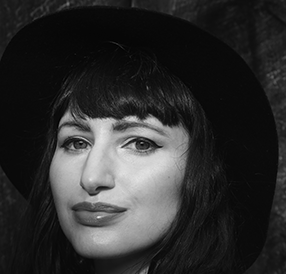All I Can Have are Field Recordings of the Field
I can never have the field. I can never halve the
field, make a helix of my hands and hold the
halves
like pictures of the field—or fields—and affix one
feeling to the fields—or the infinite field—and stay
that way
I can walk down to the bog, the field
under-foliate-feet, in a bloodflow motion towards
the beating
of the bullfrogs’ black-lacteous tactile pool and
listen to the unilluminable below-surface stirring,
gravid ruckus of drooling purr and primordial bluebrown
blur. I can aggravate the grating godhood and glisten
of preening slime—its opaque, plumbeous,
tympanic slurps—an inside-outside alertness
bur-bur-bur-bur-
burrowing, harping with pings and plops
(lurches), and make the mossy froth go
berserk with silence,
then foofaraw when the bog in the field senses I am
nothing to fear. I can hear amphibious amour fou
pulsing
under a blue-green gasoline film, spongiform but
formless, boiling with blotched air-bubble let-go, life
fumping
the surface in slicks of upward rain and glossopalatine
pops and liquid crop circles. I can stop here and
listen
in time with the bobolink and make my bel
memento, my untremendous tremolo and
rinky-dink dictation.
In the fable, the animal smells fear and so does the
fool. I think to myself—in my skull’s skeletal
bell-shape—
I am both. I am both. I am both, and I can hold it
together.
Copyright © 2020 by Kristina Martino. Originally published in Poem-a-Day on April 28, 2020, by the Academy of American Poets.
“This ars poetica sets up a loose dichotomy of what the poem and poet can and can’t do, and then almost immediately gets lost in a litany of the narrator’s own listening and mimicry thereof. The actions embody the sounds of the field in the poem’s language so that the poem becomes its own field recording of sorts. Both the experiences of being in nature and being in a poem are acts of time, and the poem recognizes its limitations as a field recording (or picture) but also its role as mundane reliquary or receptacle. Ultimately there can be no ownership of nature, only observation, and the poem acts as a container that holds disparate elements together and enacts its own landscape via language.”
—Kristina Martino

